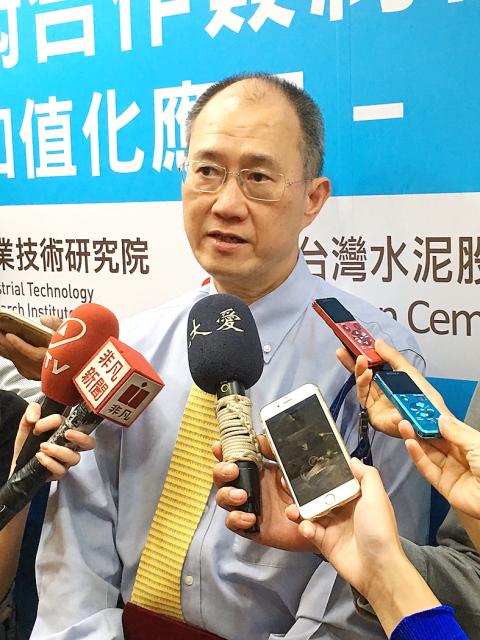Taiwan Cement Corp (台灣水泥) yesterday appointed board director Nelson Chang (張安平) as acting chairman after chairman Leslie Koo (辜成允) was admitted to intensive care after falling down a flight of stairs at a Taipei hotel on Saturday.
Chang is Koo’s brother-in-law.
Koo has headed the nation’s largest cement maker since 2003. The company’s board held an extraordinary meeting yesterday at which Chang was also appointed temporary chairman of two Taiwan Cement affiliates — China Synthetic Rubber Corp (CSRC, 中國合成橡膠) and Taiwan Prosperity Chemical Corp (TPCC, 信昌化學工業).

Photo: CNA
“The chairman has been hospitalized and is unable to carry out his duties,” Taiwan Cement said of the board’s decision in a Taiwan Stock Exchange filing.
Koo fell down a flight of stairs at the Regent Taipei (晶華酒店) on Saturday night while attending a wedding banquet. He was taken to Mackay Memorial Hospital at about 9pm, reports said.
Koo was still in hospital, but his condition has been downgraded, the Central News Agency cited the company as saying yesterday.
Koo, 63, is the second son of the late Koo Chen-fu (辜振甫), a former chairman of the Straits Exchange Foundation.
Taiwan Cement reported sales of NT$89.57 billion (US$2.84 billion) last year, down 4.38 percent from the previous year. Net profit in the first three quarters of last year increased 13.63 percent to NT$4.55 billion, or earnings per share of NT$1.23.
Shares of Taiwan Cement closed at NT$34.95 on Friday, up 36.26 percent over the past 12 months, Taiwan Stock Exchange data showed.

SELL-OFF: Investors expect tariff-driven volatility as the local boarse reopens today, while analysts say government support and solid fundamentals would steady sentiment Local investors are bracing for a sharp market downturn today as the nation’s financial markets resume trading following a two-day closure for national holidays before the weekend, with sentiment rattled by US President Donald Trump’s sweeping tariff announcement. Trump’s unveiling of new “reciprocal tariffs” on Wednesday triggered a sell-off in global markets, with the FTSE Taiwan Index Futures — a benchmark for Taiwanese equities traded in Singapore — tumbling 9.2 percent over the past two sessions. Meanwhile, the American depositary receipts (ADRs) of Taiwan Semiconductor Manufacturing Co (TSMC, 台積電), the most heavily weighted stock on the TAIEX, plunged 13.8 percent in

A wave of stop-loss selling and panic selling hit Taiwan's stock market at its opening today, with the weighted index plunging 2,086 points — a drop of more than 9.7 percent — marking the largest intraday point and percentage loss on record. The index bottomed out at 19,212.02, while futures were locked limit-down, with more than 1,000 stocks hitting their daily drop limit. Three heavyweight stocks — Taiwan Semiconductor Manufacturing Co (TSMC, 台積電), Hon Hai Precision Industry Co (Foxconn, 鴻海精密) and MediaTek (聯發科) — hit their limit-down prices as soon as the market opened, falling to NT$848 (US$25.54), NT$138.5 and NT$1,295 respectively. TSMC's

TARIFFS: The global ‘panic atmosphere remains strong,’ and foreign investors have continued to sell their holdings since the start of the year, the Ministry of Finance said The government yesterday authorized the activation of its NT$500 billion (US$15.15 billion) National Stabilization Fund (NSF) to prop up the local stock market after two days of sharp falls in reaction to US President Donald Trump’s new import tariffs. The Ministry of Finance said in a statement after the market close that the steering committee of the fund had been given the go-ahead to intervene in the market to bolster Taiwanese shares in a time of crisis. The fund has been authorized to use its assets “to carry out market stabilization tasks as appropriate to maintain the stability of Taiwan’s

In a small town in Paraguay, a showdown is brewing between traditional producers of yerba mate, a bitter herbal tea popular across South America, and miners of a shinier treasure: gold. A rush for the precious metal is pitting mate growers and indigenous groups against the expanding operations of small-scale miners who, until recently, were their neighbors, not nemeses. “They [the miners] have destroyed everything... The canals, springs, swamps,” said Vidal Britez, president of the Yerba Mate Producers’ Association of the town of Paso Yobai, about 210km east of capital Asuncion. “You can see the pollution from the dead fish.